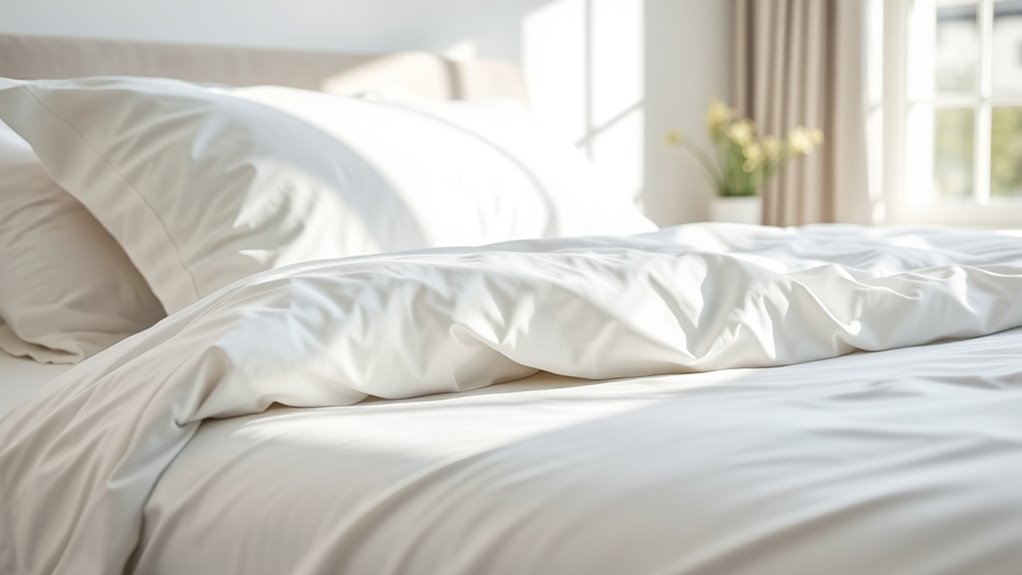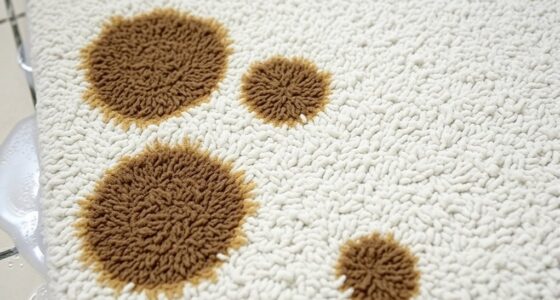To keep your sleep environment clean and healthy, wash your bedding at least once a week. This helps remove sweat, oils, dust mites, and bacteria that can cause skin issues or respiratory problems. If you have allergies, asthma, or sensitive skin, consider washing more often—every 3-4 days. For comforters and duvet covers, every 1-2 months usually suffices. Staying consistent with your bedding care can make a noticeable difference in your overall health. Keep going to explore more tips for ideal hygiene.
Key Takeaways
- Wash sheets weekly to effectively reduce dust mites, bacteria, and allergens, ensuring a healthier sleep environment.
- Increase washing frequency to every 3-4 days if you have allergies, asthma, or sensitive skin.
- Use hot water (~130°F/54°C) for bedding when fabric allows, to eliminate germs and dust mites effectively.
- Dry bedding thoroughly on high heat or sun-dry to prevent mold, mildew, and microbial growth.
- Regularly wash pillowcases weekly and comforters every 1-2 months to maintain overall bedding hygiene.

Your bedding needs regular washing to keep your sleep environment clean and healthy. This isn’t just about maintaining a fresh scent; it’s about reducing the buildup of sweat, oils, dead skin cells, dust mites, and bacteria that can accumulate over time. When you sleep, your body sheds skin and releases moisture, creating an environment where germs and allergens thrive if not cleaned frequently. Regular washing helps eliminate these irritants, promoting better sleep quality and reducing allergy symptoms.
Most experts recommend washing your sheets at least once a week. This frequency is backed by hygiene science, which shows that weekly cleaning minimizes the presence of dust mites and bacteria that can contribute to respiratory issues or skin irritation. If you or your household members have allergies, asthma, or sensitive skin, you might want to wash your bedding more often—every 3 to 4 days—to keep allergens at bay. On the other hand, if you’re healthy and sleep alone, some people extend this period to every two weeks, but weekly remains the gold standard for ideal hygiene.
When you wash your bedding, use hot water—around 130°F (54°C)—if the fabric allows. Hot water effectively kills germs and dust mites, providing a deeper clean. If your sheets are made of delicate fabric that can’t handle high temperatures, opt for the warmest water setting safe for the material and consider adding a disinfectant or an allergen-reducing laundry additive. Always check the care label before washing to prevent damaging your sheets or duvet covers. Using a quality detergent designed for bedding can improve cleanliness and help break down oils and dirt more efficiently.
Drying your bedding thoroughly is equally important. If possible, tumble dry on high heat to ensure any remaining microbes are eliminated. Sun-drying is a natural alternative that also helps disinfect, thanks to ultraviolet rays. Properly dried bedding prevents the growth of mold or mildew, which can develop in damp environments and cause health issues. Additionally, choosing bedding made with hypoallergenic materials can further reduce exposure to common allergens.
In addition to sheets, pillowcases should be washed at least once a week, especially if you tend to sweat or have allergies. Comforters and duvet covers usually need less frequent washing—about once every month or two—unless you notice stains or odors. Regularly washing your bedding isn’t just a chore; it’s an essential part of creating a safe, hygienic sleep space that supports your overall health and well-being.
Frequently Asked Questions
Can Washing Bedding Too Often Harm the Fabric?
Washing bedding too often can indeed harm the fabric, causing it to wear out faster and lose its softness. Frequent washing exposes the material to detergents and agitation, which can weaken fibers over time. To protect your bedding, wash it when it’s visibly dirty or has an odor, typically every one to two weeks. Use gentle cycles and cold water to prolong the lifespan of your bedding.
How Does Bedding Hygiene Affect Allergy Sufferers?
If you’re allergy-prone, maintaining good bedding hygiene helps reduce allergens like dust mites, pet dander, and mold. Regularly washing your sheets, pillowcases, and blankets minimizes these triggers, easing allergy symptoms and improving sleep quality. Using hot water and hypoallergenic detergents, and washing bedding at least once a week, keeps allergens at bay. Staying consistent with this routine makes a noticeable difference in managing allergies and creating a healthier sleeping environment.
Are There Eco-Friendly Methods to Clean Bedding Effectively?
You can clean your bedding effectively using eco-friendly methods that pack a punch. Opt for natural detergents made from plant-based ingredients, which are gentle on the environment and your skin. Wash at lower temperatures to save energy, and add white vinegar or baking soda as natural disinfectants. These eco-conscious steps help keep your bedding fresh and hygienic without harming the planet—proving that you can kill two birds with one stone.
What Are Signs That Bedding Needs Washing Sooner?
You should wash your bedding sooner if you notice any musty odors, visible stains, or if you’ve been sick recently. Allergies or respiratory issues can also be signs that your bedding needs extra attention. If you sweat a lot at night or have pets that sleep on your bed, washing more frequently helps keep germs and allergens at bay. Trust your senses and clean when things start to feel or smell off.
Does the Type of Bedding Material Impact Washing Frequency?
Yes, the type of bedding material impacts how often you should wash it. Natural fabrics like cotton and linen breathe better and can usually go longer between washes, while synthetic materials like polyester trap more sweat and oils, needing more frequent cleaning. If you have sensitive skin or allergies, wash delicate or breathable fabrics more often. Always check manufacturer care instructions to keep your bedding in the best condition.
Conclusion
So, it turns out that washing your bedding weekly not only keeps germs at bay but also coincidentally guarantees you wake up feeling fresher and more energized. When you toss those sheets into the wash, you’re not just cleaning—they’re symbolically washing away the day’s stress. It’s a simple routine that lines up perfectly with your desire for cleanliness and comfort, making each morning just a little brighter. Coincidentally, a fresh bed might be the best way to start your day.









